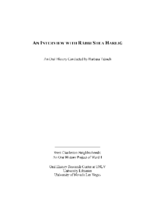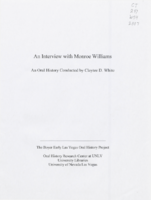Search the Special Collections and Archives Portal
Search Results

Transcript of interview with Rabbi Shea Harlig by Barbara Tabach, March 5, 2014
Date
Archival Collection
Description
Interview with Rabbi Shea Harlig by Barbara Tabach on March 5, 2014. In this interview, Rabbi Harlig discusses the Chabad movement of Orthodox Judaism and establishment of Chabad centers in Las Vegas and Southern Nevada. Rabbi Harlig talks about the property he has acquired for Chabad, and its outreach programs, including supervision of kosher kitchens in hotels. This interview was conducted for the Ward 1: West Charleston Neighborhoods oral history project, and therefore includes zoning and neighborhood discrimination issues, and a tour of the property.
Rabbi Shea Harlig arrived in Las Vegas in 1990 and settled in the Artesian Heights neighborhood of Las Vegas. As Director of Chabad of Southern Nevada, Rabbi Harlig focuses on religious outreach, education and social services, and has helped establish seven Chabad locations throughout the community and also built a school and educational program of the highest standards.
Text

Transcript of interview with Theresa Jones Denning by Lynn Kelstron Ballard, February 26, 1977
Date
Archival Collection
Description
On February 26, 1977, Lynn Kelstrom Ballard interviewed Teresa Jones Denning (born in Overton, Nevada in 1912) about her life in Southern Nevada. Denning first talks about her family background and her upbringing in Overton, including her life on a farm and her education in that small town. Denning also talks about her recreational pastimes before talking about the building of Boulder Dam and her life in Boulder City. Towards the end of the interview, she talks about her work as a driver for Las Vegas High School, her husband’s work on the Boulder Dam, and the changes in living conditions that she has noticed in Boulder City over time.
Text

Transcript of interview with Don Hayden by Steven Cohen, March 1, 1979
Date
Description
On March 1, 1979, collector Steven Cohen interviewed school administrator, Don Hayden (born in Ogden, Utah) in his home in Las Vegas, Nevada. This interview offers a historical overview of the education system in Nevada. Don also discusses gambling, the early atomic tests, the first hospitals built in Las Vegas, and offers his own personal account on home and family life in Nevada.
Text

Transcript of interview with Stephen Nasser by Barbara Tabach, January 17, 2018
Date
Archival Collection
Description
At the age of thirteen, the incredible life journey of Stephen “Pista” Nasser (b. 1931 - ) is preserved in his heart. His ordeal begins when his family are ripped from their home to be interred in a Nazi concentration camp in 1944. Fifty years later, he sits in his Las Vegas home and reflects on his calling to write and speak about his survival and losses. His ordeal is preserved in his book My Brother’s Voice (2013) and in his follow up stage production Not Now Pista. He is also the author of a companion memoir, Journey to Freedom. Stephen and his wife Francoise are tireless in their travels throughout the United States and the world. At the time of this 2018 oral history interview, Stephen had done over 1092 presentations about his harrowing life story to thousands of people of all ages and denominations. Each presentation fills a spot in his heart as he honors his brother and reminds listeners that such devastating episode in history should not be forgotten, and should never occur again. The timing of this interview also coincided with the premiere of a 20-minute documentary based on his writings and the play production. It was shown at the 2018 Las Vegas Jewish Film Festival. Note: the photo above of Stephen and Francoise Nasser was taken shortly after this interview on their next cruise. (2018)
Text

Transcript of interview with Myrtle Hancock by Russell Oakes. February 26, 1980
Date
Archival Collection
Description
On February 26, 1980, collector Russell Oakes interviewed beautician, Myrtle Hancock (born January 1st, 1921 in Craig, Colorado) in her residence in Las Vegas, Nevada. This interview covers the narrator’s occupational experience as a wardrobe dresser in the entertainment industry in Las Vegas. She also discusses family life, life on a ranch, Downtown Las Vegas, Helldorado, and Nevada’s hot weather. The interview concludes with a discussion on the development of Las Vegas and the projected future growth.
Text
Audio recording clip of interview with Benjamin C. Diven by Mary Palevsky, March 10, 2004
Date
Archival Collection
Description
Sound
Audio recording clip of interview with George and Theresa Maynard by Mary Palevsky, January 26, 2004
Date
Archival Collection
Description
Sound
Audio recording clip of interview with George and Theresa Maynard by Suzanne Becker, February 16, 2005
Date
Archival Collection
Description
Sound

Felipé Goodan interview, April 1, 2019: transcript
Date
Archival Collection
Description
Interviewed by Monserrath Hernández. Rabbi at Temple Beth Sholom since 1998, Felipe Goodman is a native of Mexico City. He identifies as a Mexican Jewish American, and shares the complexities of these.
Text

Transcript of interview with Monroe Williams by Claytee D. White, August 15, 2000
Date
Archival Collection
Description
Interview with Monroe Williams conducted by Claytee D. White on August 15, 2000. Williams was one of the first black firefighters in 1963, later becoming involved in real estate. He and his wife, Brenda Williams, were community leaders.
Text
